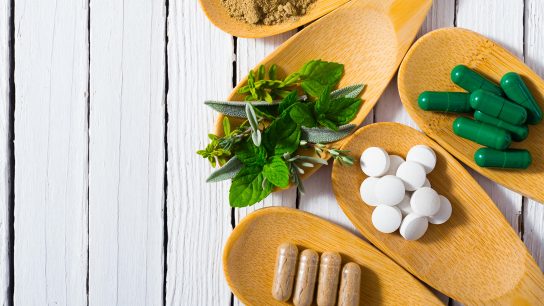Can Vegans consume Multivitamins? Is it safe to do so?
This post discusses whether vegans can take multivitamin supplements.

A vegan diet excludes all kinds of animal products, including milk and milk products like butter, cheese, ghee, cottage cheese, curd, yoghurt, whey proteins etc., honey, and any processed foods containing substances derived from animals like gelatine, bone char, carmine etc. There are various reasons why people would choose a vegan diet – the reasons could range from wanting to lead a healthier lifestyle, wanting to reduce their carbon footprint and contribute to environmental conservation, or for the sake of farm animals subjected to cruel and inhumane living conditions.
Though a vegan diet is much healthier than the diet of a meat-eater or even a vegetarian, it is not completely perfect either. In fact, a vegan diet could be found to lack certain essential micronutrients.
This is where multivitamins come into play. They are synthetic preparations of a collection of many essential vitamins and minerals packed together in a single tablet or capsule. They usually contain enough vitamins and minerals to meet the daily recommended levels. But are multivitamins suitable for vegans? Do they contain animal-derived products that make them unsuitable for vegans? Let’s find out.
Are Multivitamins Vegan?
The harsh reality is that most multivitamins are not vegan.
Gelatine is used in the manufacture of multivitamin capsules by well-known companies. It is a polysaccharide, similar to starch, and like other polysaccharides, it is digested by our bodies and leaves no residue. Gelatine is an animal product that is made by boiling the tissues of pigs, cows, and goats (meat industry waste such as hooves, intestinal linings, and stomachs).
Carmine, as the name implies, is a red pigment that is produced in the bodies of Cochineal, a kind of a scaled insect. Millions of these insects are crushed ruthlessly to produce the die that colours our foods, including some multivitamin tablets.
Codfish are popular because the oil extracted from their liver is rich in Vitamins A and D, as well as omega 3 fatty acids. These oils are also added to multivitamins, which then makes them unfit for vegan consumption.
Calcium is essential for strong bones. Most producers simply crush animal bones into a very fine powder and add them to their multivitamin preparation.
Not only are these methods unsanitary, but are also extremely cruel and barbaric. There are many more animal sources used in the production of multivitamins. These companies are not at all honest about the sources of their supplement tablets and even falsely claim that certain vitamins only have animal sources.
Natural Sources of vitamins
Fortunately for vegans, most vitamins can be derived from plants. Consuming two medium-sized bowls of assorted vegetables and fruits can very well fulfil your daily vitamin intake. There is a reason why our parents force us to eat our veggies, after all.
Vitamin A contributes to healthy vision and skin. Most coloured vegetables and fruits like carrots, pumpkins and squashes are rich sources of Vitamin A.
Thiamine, also called Vitamin B1, is found in unpolished cereals, legumes and nuts. It helps in converting glucose into energy. Riboflavin (Vitamin B2) is found in wholegrain cereals, leafy green vegetables, and yeast, and it aids in the maintenance of healthy skin.
Niacin, often known as Vitamin B3, aids in the production of energy from carbohydrates and improves skin health. Mushrooms, whole grains and nuts are rich sources of Vitamin B3. Vitamins B5 and B6 are found in yeast, legumes and leafy vegetable.
Ascorbic Acid (commonly known as Vitamin C) is an excellent immunity booster and helps maintain gum health, and is abundantly found in all citrus fruits. Vitamin D is best obtained by exposure to the sun. Vitamin E is found in vegetable oils, almonds and hazelnuts.
Vegan Multivitamins
Since the advent of the 21st Century, there has been a steady rise in veganism and vegan diets. However, the inevitable truth is that vegan diets lack certain micronutrients like Folic Acid, vitamin B12, and DHA. Thanks to the rise in veganism, a lot of new companies have come up with Vegan multivitamins. They are different from conventional multivitamins in one aspect alone – they do not contain any animal-derived ingredients. They are safe to be consumed by all individuals, vegan or not.
In recent times, the vegan market has expanded exponentially, and there are as many vegan supplements as there are non-vegan supplements. They contain all essential vitamins and minerals and are derived from plant sources. Most vegan multivitamins also have the advantage of being allergen-free. These vegan brands tend to be more transparent but what goes inside their products, as well.

